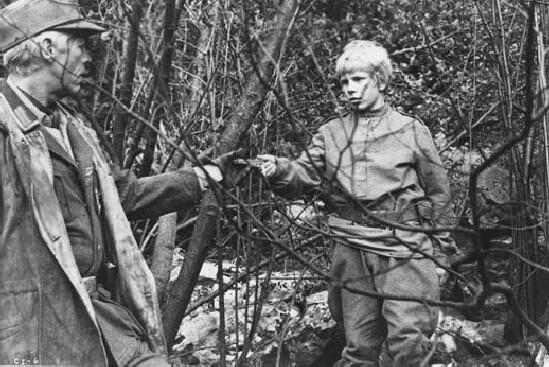
Cross of Iron - (International, 1977)

Figure 1.--Child actor Slavko Stimac played in the gritty World War II movie, "Cross of Iron". Yugoslavian born Slavko was billed as Mikael Slavko Stimac to sound more Russian. It was an international production, especially British and German, with the message of the futility of war. The problem is that the war on the Eastern front was one of the least futile wars in history.
|
|
Child actor Slavko Stimac played in the gritty World War II movie, "Cross of Iron". Yugoslavian born Slavko was billed as Mikael Slavko Stimac to sound more Russian as the film is set on the Eastern Front. One report said that this as a Russian movie, but this does not appear to be the case. Our reader probably meant tht the film was set in Russia. Rather it appers to be an international production, especially British and German. It was produced in 1977 and directed by Sam Peckinpah and featured some very distinguished actors, British, American, and German, including James Coburn, Maximilien Schell, James Mason, and David Warner. The child
actor, Slavo Stimac, who plays the part of Michail, is uncredited in the cast list. The film is a very realistic anti-war film that shows the horrors of war with no winners on any political or ethnic side. This of course is not the nature of Soviet films aied at the domestic market.
The plot concerns Rolf Steiner (played by James Coburn), a war-hardened veteran of the German World War II Whermacht. He leads his men through every battle and danger with a genuine concern for their survival during the madness of the German advance on the Russian front. Then a Prussian officer (Maximilian Schell), who has volunteered to leave the battle-free zone of occupied France, joins the fighting group with only one object in mind--to earn the Iron Cross for bravery at any cost and
thus continue his family's tradition of honor in battle. He is trying to avoid the disgrace of emerging from the war as a soldier who has not experienced the greatest extreme of danger. The film is based on the conflict of attitudes between the two German officers--the one who wishes to survive and the other who is almost suicidally romantic in the pursuit of honor. The tension accumulates until it eventually
explodes. The film gives an excellent and realistic rendering of what war on the Eastern Front was really like, especially after the German army had suffered a major defeat at the battle of Stalingrad. We see the original optimism of the German troops turn to cynicism and almost despair. No prisoners were taken and captives were shot on the spot. The technique of the film avoids the cliches and phony heroism of many Hollywood war films. One of the most effective scenes juxtaposes the voice of a child singing a "happy" song with the actual horrors of death and mass destruction--a contrast that frames the action at the beginning and at the end. "Cross of Iron" is sometimes compared to another famous anti-war film, "All Quiet on the Western Front" (about World Ward I). While the film accurately depicts the horrors of war, at least as well as can be done in film, but the film avoids the terrible attrocutes the Wehrmacht committed against civilians on the Eastern Front. Of course that would detract from the political statement that the producers wanted to make--the futility of war. In fact the struggle on the Eastern Front was not a futile struggle. It was a war of national struggle against NAZI Germany which was intent on genocide against the Slavic people. The film did not do well in Amrica, but was better recieved in Europe.
HBC

Navigate the Boys' Historical Clothing Web Site:
[Return to the Main "Cm-Cr" movie page]
[Return to the Main Russian movie page]
[Introduction]
[Activities]
[Biographies]
[Chronology]
[Clothing styles]
[Countries]
[Theatricals]
[Bibliographies]
[Contributions]
[FAQs]
[Glossaries]
[Images]
[Links]
[Registration]
[Tools]
[Boys' Clothing Home]
Created: 1:26 AM 6/5/2007
Last updated: 2:46 PM 6/5/2007



